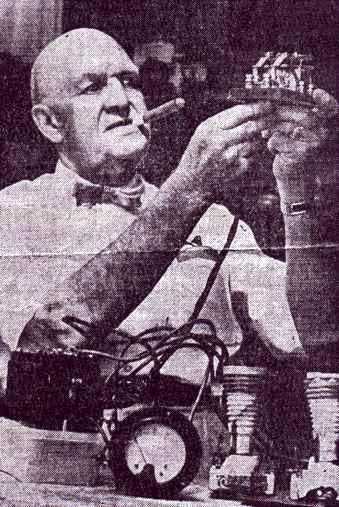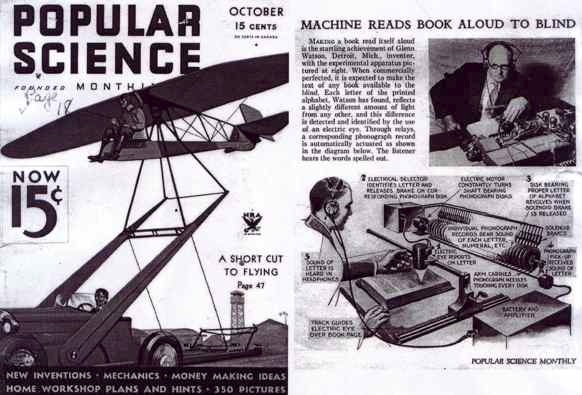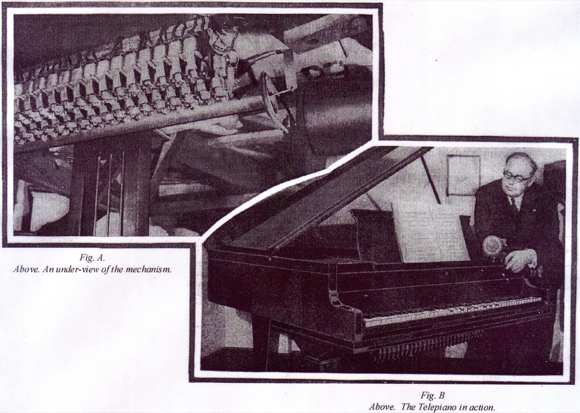Watching the History’s Detectives segment about Thomas Edison reminded me of another inventor who had an interest in subjects related to parapsychology: Glenn W. Watson. From my book:

“Just before Rhine retired from Duke in 1965, a 75-year-old inventor named Glenn W. Watson started writing Clement Stone, one of Rhine’s financial contributors. He was looking for financing for Telepathy-Type, a typewriter that would type out messages received telepathically. Watson, the inventor of the radio typewriter, had come up with the idea 30 years before. AT&T had worked for years on a similar project, Watson said, but had gotten nowhere.
“Stone asked Rhine what he thought and Rhine said the idea had no merit. Engineers young and old had attempted approaching the problem this way, he said. But what they all failed to understand was “that the limiting factor is in the individual, in the deep recesses of human personality, and not in the gadgetry of transmission.” Watson’s plan was “based on a complete misconception of what telepathy is and how it works.”
“Point taken about the limiting factor. But no one really knew what telepathy was or how it worked, including Rhine.”
That came out harsher than I had intended, although technically true. I think in part I was defending Glenn Watson and all the engineers of the world. Watson might have had a different take on the problem, but it was possible that the results of his efforts could have been enlightening. In any case, Watson died a few years later sadly, in 1969. But he has an interesting history of inventions and accomplishments.
In 1931, Watson invented something called a radio typewriter. Someone types a message on a typewriter and the message is transmitted via radio waves to a printer. He introduced his invention to the world by sending a message to Admiral Byrd who was in Antarctica at the time. Quite the showman!
A couple of years later Watson developed a machine to read aloud to the blind. Now why isn’t he more well known for that?? Did something come along soon after that surpassed his invention?

Watson also came up with he called the telepiano. The idea was a pianist would play a piano in one location, and that would be transmitted, again via radio waves, to every properly equipped telepiano which would then start playing whatever the pianist had just played. Fun, but I’m skeptical about how well the telepianos could recreate the subtler aspects of the original performance.

In the end, according to a Detroit Free Press article, Watson felt “his greatest work—the demonstration of mental telepathy—is still to be recognized.”
“I’ll put it over,” he said with confidence. “I know how, but people aren’t ready for it yet. No one believes in anything new, so an inventor has to be a salesman, too.” [True, true.] He also said he was working with “Duke University scientists who are studying extra-sensory perception.”
I don’t remember coming across anything to confirm that, but even though Rhine was skeptical about Watson’s device, it doesn’t mean he wouldn’t have met with him and heard him out. While looking around to see if I had anything else in my files about Watson I found another Detroit Free Press article (August 7, 1950 ) which says Watson applied for a patent for the telepathy machine, and describes how the machine would operate.

“The machine would have a revolving belt carrying all the letters of the alphabet and other symbols to make sentences. There would be a key and when you pressed it, as the belt revolved below, it would stamp out a particular letter.
“Now to test out mental telepathy you would use two of these machines. One man, who was going to try to send a message by thought, would have a machine in a place remote from one who was to be the receiver.
“The two machines would be synchronized so the belts would be moving together—the same letters passing under the key at the same time.
“The one who was sending would look at the machine and as the letter—let’s say ‘C’—passed below his key he would send the thought ‘now’ or ‘hit it’ to the receiver.
“The receiver would just punch down his key when he thought he received a ‘thought impulse’ to do it. If mental telepathy was working he should hit the ‘C’ the sender wanted him to get.”
Watson thought he could build his telepathy machine for $2,500, but ultimately the machines would cost $97 a piece when he could build them in the thousands.
[The first picture is from Watson’s obituary, Detroit Free Press November 20, 1969. The second is from Popular Science, 1931, and the next one is from Radio-Craft. The date is cut off, but it’s from the thirties. The last picture is also from Popular Science, 1933, and it’s a picture of Watson with his radio typewriter, not the telepathy machine, which I suspect was never built.]

Nice idea, but what’s to stop the very same idea being tried out on a modern day keyboard? Essentially, someone transmits a thought and someone else, in an unknown location, randomly presses a button? Mind you, I’d wager the success rate would drop below the usual standard you see when using psi test cards…
I am Glenn Watson’s 1st Great Grandchild,and I feel blessed by your recognition of our father.grandfather and now great to the 3rd degree..This peice made my face hurt smiling and brought tears to my eyes and made my Heart grow THANK YOU I THINK HIS DREAMS HAVE COME TRUE!!
Hello! Thank you for stopping by. Your great grandfather was such an amazing, interesting person!
My Name is Laurie Beth Tucker and I am the 1st Great Grand daughter Of Glenn Watson. Baby sister of Dan Tucker. I’m so glad he told me about this website. I’m sure all of our family will enjoy this. I can smell his cigar still to this day, thank you so much!
I am the 3rd Great Grandchild of Glenn Watson, man that sounds cool.
A sincere thank you Miss Stacy for your article.
People still look at me like I’m crazy when I talk about the telepathy machine.
Thanks again for the affirmation of truth.
Welcome to all the Tuckers!